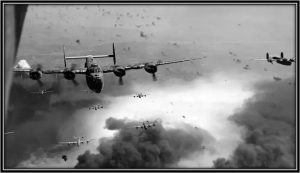On This Day in Aviation History: Shared Grief
Contributor: Barry Fetzer
Sources: History.com
We forget (at our peril) to what lengths and what risks and what sadness and what grief we had to go to stop tyranny. Today we can launch missiles from unmanned vehicles with little sadness in the ensuing death and destruction except in the case of the recipient. There’s little risk and grief on the part of the deliverer.
That wasn’t the case in August of 1943 and God forbid when we get into a world war-type shooting match again, it likely, again, won’t be the case. Both sides will likely suffer the sadness and grief and death and destruction.
On this day in aviation history on August 1, 1943, according History.com, “177 B-24 bombers took off from an Allied base in Libya, bound for the oil-producing city Ploiești, Romania, nicknamed “Hitler’s gas station.” The daring raid, known as Operation Tidal Wave, resulted in five men being awarded the Medal of Honor—three of them posthumously—but failed to strike the fatal blow its planners had intended.
“Operation Tidal Wave began ominously, with an overloaded bomber crashing shortly after takeoff and another plunging into the Adriatic Sea. 167 of the original 177 bombers made it to Ploiești, whose oil fields and refineries provided the Germans with over 8.5 million tons of oil per year. Whereas most Allied bombing in World War II was carried out from a high altitude, the bombers that raided Ploiești flew exceptionally low in order to evade the Germans’ radar. The bombers lost the element of surprise, however, when one group veered off on the wrong direction, forcing the others to break radio silence in order to direct them back on course. This unplanned adjustment also led to the bombers approaching from the south, where the Nazis had concentrated their anti-aircraft batteries.

Photo Credit: Mondadori via Getty Images
“The ensuing attack was dramatic, chaotic and costly. The Allies suffered heavy casualties, and smoke from the explosions caused by the first wave of bombers made visibility difficult for subsequent waves. Survivors reported debris like branches and barbed wire hitting and even ending up on the inside of their planes. Lt. Col. Addison Baker and Maj. John Jerstad were awarded the Medal of Honor for their (unsuccessful) attempt to fly higher and allow the crew to bail out of their badly damaged plane. Another pilot, Lt. Lloyd Herbert Hughes, also received a posthumous Medal of Honor for flying his critically-damaged B-24 into its target. Col. John Kane and Col. Leon Johnson, who each led bombing groups that reached their targets, were the only men who were awarded the Medal of Honor and survived the raid.
“Although the Allies estimated that the raid had reduced Ploiești’s capacity by 40 percent, the damage was quickly repaired and within months the refineries had outstripped their previous capacity. The region continued to serve as “Hitler’s gas station” until the Soviet Union captured it in August of 1944. 310 airmen died, 108 were captured and another 78 were interned in neighboring Turkey. 88 of the original 177 B-24s returned, most of them seriously damaged. Despite setting the record for most Medals of Honor awarded to airmen in a single mission, Operation Tidal wave was never repeated—the Allies never again attempted a low-altitude assault against German air defenses.”
Onward and Upward!







